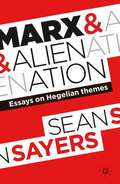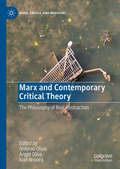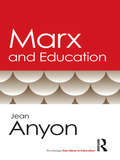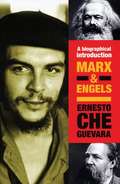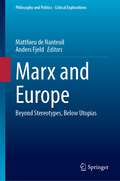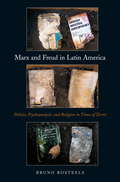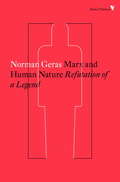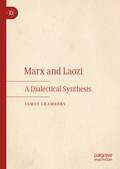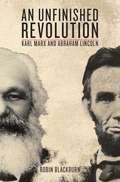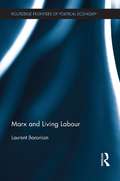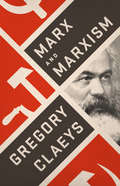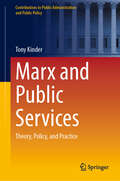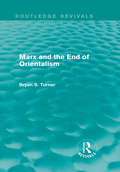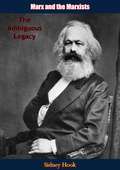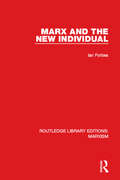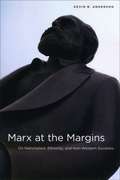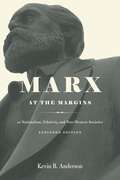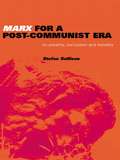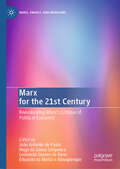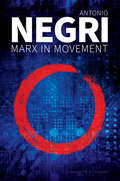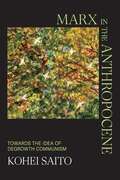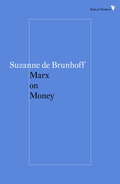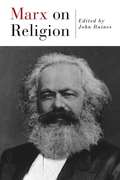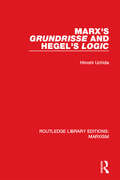- Table View
- List View
Marx and Alienation
by Sean SayersThe concepts of alienation and its overcoming are central to Marx's thought. They underpin his critique of capitalism and his vision of future society. Marx's ideas are explained in rigorous and clear terms. They are situated in the context of the Hegelian ideas that inspired them and put into dialogue with contemporary debates.
Marx and Contemporary Critical Theory: The Philosophy of Real Abstraction (Marx, Engels, and Marxisms)
by Antonio Oliva Ángel Oliva Iván NovaraThis edited volume brings together an international and interdisciplinary group of scholars to explore the traces of the idea of “Real Abstraction” in Marx’s thought from the early to late writings, as well as the theoretical and practical consequences of this notion in the capitalist social system. Divided into two main parts, Part One reconstructs Marx’s notion of “Real Abstraction” and the influences of earlier thinkers (Berkley, Petty, Franklin, Feuerbach, Hegel) on his thoughts, as well as the further elaborations of this concept in later Marxist thinkers (Sohn-Rethel, Lukács, Lefebvre, Adorno and Postone). Part Two then considers the reverberations of the notion in the field of critical theory from a more abstract critique of capitalist social relations, to a more concrete understanding of historical movements. Taken together, the chapters in this volume offer a focused look at the concept of “Real Abstraction” in Marx.
Marx and Education (Routledge Key Ideas in Education)
by Jean AnyonThere was only one Karl Marx, but there have been a multitude of Marxisms. This concise, introductory book by internationally renowned scholar Jean Anyon centers on the ideas of Marx that have been used in education studies as a guide to theory, analysis, research, and practice. Marx and Education begins with a brief overview of basic Marxist ideas and terms and then traces some of the main points scholars in education have been articulating since the late 1970s. Following this trajectory, Anyon details how social class analysis has developed in research and theory, how understanding the roles of education in society is influenced by a Marxian lens, how the failures of urban school reform can be understood through the lens of political economy, and how cultural analysis has laid the foundation for critical pedagogy in US classrooms. She assesses ways neo-Marxist thought can contribute to our understanding of issues that have arisen more recently and how a Marxist analysis can be important to an adequate understanding and transformation of the future of education and the economy. By exemplifying what is relevant in Marx, and replacing that which has been outdone by historical events, Marx and Education aims to restore the utility of Marxism as a theoretical and practical tool for educators.
Marx and Engels: A Biographical Introduction
by Ernesto Che GuevaraThis Che Guevara book makes an insightful contribution to the revival of interest in Marxism. Commenting on Marx's humanism, Che writes: "Such a humane man, whose capacity for affection extended to all those suffering throughout the world."
Marx and Europe: Beyond Stereotypes, Below Utopias (Philosophy and Politics - Critical Explorations #30)
by Matthieu De Nanteuil Anders FjeldThis book provides a unique scientific contribution to the debate on Marx's legacy in proposing to critically articulate two “lines of discussion” which are most often kept apart. On the one hand, it reassesses the place of Marxian thought in the construction of Europe, seeking to revitalize the European political debate. On the other, it situates Marx' thought in the perspective of postcolonial and decolonial studies, with particular attention to their effort to overcome the indisputable limits of the Marxian legacy. In asking whether Marx’ thought was too European or not European enough, the book examines internationalist emancipatory politics and eurocentrism, class struggle and finance in the shaping of the European institutions, migration, identity and violence, as well as Marxian critiques of colonialism both within and beyond Europe. At a time of extreme tension, also within leftist politics, this book provides a precise and rigorous argument on what continues to make Marx'sthought relevant, in grappling with social domination in the era of global capitalism, while also exploring the limits of Marxism today, both at the European level and worldwide.
Marx and Freud in Latin America
by Bruno BosteelsThis book assesses the untimely relevance of Marx and Freud for Latin America, thinkers alien to the region who became an inspiration to its beleaguered activists, intellectuals, writers and artists during times of political and cultural oppression.Bruno Bosteels presents ten case studies arguing that art and literature--the novel, poetry, theatre, film--more than any militant tract or theoretical essay, can give us a glimpse into Marxism and psychoanalysis, not so much as sciences of history or of the unconscious, respectively, but rather as two intricately related modes of understanding the formation of subjectivity.
Marx and Human Nature
by Norman Geras"Marx did not reject the idea of a human nature. He was right not to do so."That is the conclusion of this passionate and polemical new work by Norman Geras. In it, he places the sixth of Marx's Theses on Feuerbach under rigorous scrutiny. He argues that this ambiguous statement--widely cited as evidence that Marx broke with all conceptions of human nature in 1845--must be read in the context of Marx's work as a whole. His later writings are informed by an idea of a specifically human nature that fulfills both explanatory and normative functions.The belief that Marx's historical materialism entailed a denial of the conception of human nature is, Geras writes, "an old fixation, which the Althusserian influence in this matter has fed upon ... Because this fixation still exists and is misguided, it is still necessary to challenge it." One hundred years after Marx's death, this timely essay--combining the strengths of analytical philosophy and classical Marxism--rediscovers a central part of his heritage.
Marx and Laozi: A Dialectical Synthesis
by James ChambersIn this work the theories of Marx and Laozi are dialectically combined. The resulting synthesis is a positive materialist negation of Hegel’s idealist dialectics. Syntheses are presented for Marx and Laozi in ontology, metaphysics, epistemology, scientific method, ethics and politics: the full spectrum of their foundational principles. The book is an attempt to reconstruct a materialist interpretation of Laozi, which can be put to work for Marxist theory.
Marx and Lincoln: An Unfinished Revolution
by Abraham Lincoln Karl Marx Robin BlackburnKarl Marx and Abraham Lincoln exchanged letters at the end of the Civil War. Although they were divided by far more than the Atlantic Ocean, they agreed on the cause of free labor and the urgent need to end slavery. In his introduction, Robin Blackburn argues that Lincoln's response signaled the importance of the German American community and the role of the international communists in opposing European recognition of the Confederacy. The ideals of communism, voiced through the International Working Men's Association, attracted many thousands of supporters throughout the US, and helped spread the demand for an eight-hour day. Blackburn shows how the IWA in America--born out of the Civil War--sought to radicalize Lincoln's unfinished revolution and to advance the rights of labor, uniting black and white, men and women, native and foreign-born. The International contributed to a profound critique of the capitalist robber barons who enriched themselves during and after the war, and it inspired an extraordinary series of strikes and class struggles in the postwar decades. In addition to a range of key texts and letters by both Lincoln and Marx, this book includes articles from the radical New York-based journal Woodhull and Claflin's Weekly, an extract from Thomas Fortune's classic work on racism Black and White, Frederick Engels on the progress of US labor in the 1880s, and Lucy Parson's speech at the founding of the Industrial Workers of the World.
Marx and Living Labour: Marx And Living Labour (Routledge Frontiers of Political Economy)
by Laurent BaronianFrom his early economic works on, Marx conceived the labour of any kind of society as a set of production activities and analysed the historical modes of production as specific ways of distributing and exchanging these activities. Political economy on the contrary considers the labour only under the form of its product, and the exchange of products as commodities as the unique form of social labour exchange. For Marx, insofar as the labour creating value represents a specific mode of exchanging the society's living labour, general and abstract labour cannot not only be defined as the substance or measure unit of the commodity, as in Smith or Ricardo, but foremost as an expense of living labour, i.e. of nerves, muscles, brain, etc. Hence the twofold nature of living labour, as a concrete activity producing a use value and an expense of human labour in general producing exchange value. Marx himself claimed that this twofold nature of labour creating value was its main and most important contribution to economic science. This book aims at showing how both determines the original categories and economic laws in Capital and constitutes the profound innerspring of Marx's critique of political economy. The role and function of living labour is highlighted by dealing with the difference between Marx and Classics' theories of labour value; money and the problems of its integration in economic analysis, especially in Keynes; the transition from feudalism to capitalism; the theory of capital through a discussion on the Cambridge controversy and the transformation problem; the labour process and the principles of labour management; unemployment and overpopulation; the formulas of capital in the history of economic thought; finally, an interpretation of the current crisis based on Marx's conception of overaccumulation and speculation after having distinguished it from underconsumption and stagnation theories of crises.
Marx and Marxism (Pelican Bks.)
by Gregory ClaeysA new biography of Karl Marx, tracing the life of this titanic figure and the legacy of his workKarl Marx remains the most influential and controversial political thinker in history. He died quietly in 1883 and a mere eleven mourners attended his funeral, but a year later he was being hailed as "the Prophet himself" whose name and writings would "endure through the ages." He has been viewed as a philosopher, economist, historian, sociologist, political theorist, even a literary craftsman. But who was Marx? What informed his critiques of modern society? And how are we to understand his legacy?In Marx and Marxism, Gregory Claeys, a leading historian of socialism, offers a wide-ranging, accessible account of Marx's ideas and their development, from the nineteenth century through the Russian Revolution to the present. After the collapse of the Soviet Union his reputation seemed utterly eclipsed, but now a new generation is reading and discovering Marx in the wake of the recurrent financial crises, growing social inequality, and an increasing sense of the injustice and destructiveness of capitalism. Both his critique of capitalism and his vision of the future speak across the centuries to our times, even if the questions he poses are more difficult to answer than ever.
Marx and Public Services: Theory, Policy, and Practice (Contributions to Public Administration and Public Policy)
by Tony KinderBy evaluating previous public management research through Marxist concepts, this textbook offers innovative solutions to public service problems. It updates Marx’s framework to reflect the growth of public services, transitioning from abstract state notions to concrete service analysis. Addressing two critical gaps, the book highlights the benefits of a Marxist approach to public services and presents Marxist ideas to examine these services at a micro level. It demonstrates the relevance of Marxist frameworks for public service professionals, critically reviews current public management knowledge, and sheds light on the dynamic nature of public services against the background of neoliberalism. While doing so, the book goes beyond a Eurocentric perspective, providing cases and practical examples from developed and developing countries, with an additional focus on Asian practices. Written by an award-winning author with years of practical experience and designed for graduate and advanced undergraduate students, each chapter sets clear learning objectives and reviews existing tools and frameworks. The chapters also present new ways of improving public services, encouraging readers to apply Marxist concepts to their contexts and cultures. This will also make this book a practical resource for practitioners and professionals, seeking to resolve their grounded public services issues.
Marx and Satan
by Richard WurmbrandThis book is a well-documented study of Marxism's roots in satanism.
Marx and the End of Orientalism (Routledge Revivals #Vol. 7)
by Bryan S. TurnerFirst published in 1978, this title analyses a range of problems that arise in the study of North Africa and the Middle East, bridging the gap between studies of Sociology, Islam, and Marxism. Both Sociology and the study of Islam draw on an Orientalist tradition founded on an idealist epistemology, ethnocentric values and an evolutionary view of historical development. Bryan Turner challenges the basic assumptions of Orientalism by considering such issues as the social structure of Islamic society, the impact of capitalism in the Middle East, the effect of Israel on territories, revolutions, social classes and nationalism. A detailed and fascinating study, Marx and the End of Orientalism will be of particular interest to students studying the sociology of colonialism and development, Marxist sociology and sociological theory.
Marx and the Marxists: The Ambiguous Legacy
by Sidney HookIn this work Sidney Hook, a distinguished scholar, examines the chief issues which have divided Marxists from non-Marxists, and Marxists from each other. This volume of exposition, comment and readings is offered as an introduction to the study of Marxism in conflicting theory and practice. A valuable collection of original source readings are provided, including "The Communist Manifesto", "Historical Materialism," "The Fetishism of Commodities," "Religion and Economics," and much more by Marx, Engels, Lenin, Stalin, Kautsky, Trotsky and Luxemburg.-Print ed.
Marx and the New Individual (Routledge Library Editions: Marxism #11)
by Ian ForbesIn what is the first sustained analysis of Marx’s attitude to the puzzle of the individual in history and society, this book, first published in 1990, challenges received views on the importance of class analysis and the place of a theory of human nature in Marx’s thought. The radical possibilities of individual agency in society are explored within a Marxian framework, and without recourse to the current fashions of methodological individualism or rational choice theory. In the context of the apparent antagonism between collectivist and individualist approaches to political explanation and social change, the author establishes that a ‘New Individual’, of singular importance for the understanding of contemporary society, can be identified. For the first time, the Grundrisse provides the basis of a major analysis of Marx’s thoughts on the individual. By illustrating the nature of the connections between collective existence and individual experience, Ian Forbes makes an important contribution towards the revitalization of socialist thought. He also develops a valuable counterpoint to rational actor models of politics and liberal theories of justice alike, by establishing the importance of a political theory that values human agency as much as it understands social and historical processes.
Marx at the Margins: On Nationalism, Ethnicity, and Non-Western Societies
by Kevin B. AndersonAnalyzing a variety of Marx's writings, including journalistic work written for the New York Tribune, Anderson presents us with a Marx quite at odds with our conventional interpretations.
Marx at the Margins: On Nationalism, Ethnicity, and Non-Western Societies
by Kevin B. AndersonIn Marx at the Margins, Kevin Anderson uncovers a variety of extensive but neglected texts by Marx that cast what we thought we knew about his work in a startlingly different light. Analyzing a variety of Marx’s writings, including journalistic work written for the New York Tribune, Anderson presents us with a Marx quite at odds with conventional interpretations. Rather than providing us with an account of Marx as an exclusively class-based thinker, Anderson here offers a portrait of Marx for the twenty-first century: a global theorist whose social critique was sensitive to the varieties of human social and historical development, including not just class, but nationalism, race, and ethnicity, as well. Through highly informed readings of work ranging from Marx’s unpublished 1879–82 notebooks to his passionate writings about the antislavery cause in the United States, this volume delivers a groundbreaking and canon-changing vision of Karl Marx that is sure to provoke lively debate in Marxist scholarship and beyond. For this expanded edition, Anderson has written a new preface that discusses the additional 1879–82 notebook material, as well as the influence of the Russian-American philosopher Raya Dunayevskaya on his thinking.
Marx for a Post-Communist Era: On Poverty, Corruption and Banality (Ideas Ser.)
by Stefan SullivanWas Marxism a variety of German Idealist self-actualization in economic form? A deeply flawed blueprint for social engineering? A catechism for post-colonial insurgencies? the intellectual foundations of modern social democracy? In this wide ranging summation, Sullivan tackles the multi-tentacled reach of Marx's legacy, and explores both the limits and the lasting significance of his ideas. Structured around three obstacles to freedom - poverty, corruption and banality - the work engages both Marx and his critics in addressing unresolved issues of the current social and political order. As such, the work, after two introductory chapters, leaves behind Marxology and its familiar cast of characters (Bernstein, Kautsky, Adorno, Lukacs, Fanon, Horkheimer, Marcuse, etc.) to address both neo-Marxist and non-Marxist interpretations of these obstacles. These include growth-led poverty alleviation, human capital theory, current debates on rent-seeking and public choice theory, weaknesses in Frankfurt School approaches to mass culture, and emerging trends in cyberspace and leisure consumption. Marx for a Post-Communist Era is credited as a foundational theoretical source in a wide range of contemporary studies. Some examples include a government-sponsored anti-corruption report in Peru, a study of neoliberalism and education reform in the UK, and an urban planning essay on museum spaces and the public good.
Marx for the 21st Century: Reevaluating Marx's Critique of Political Economy (Marx, Engels, and Marxisms)
by João Antonio de Paula Hugo da Gama Cerqueira Leonardo Gomes de Deus Eduardo da Motta e AlbuquerqueThis book offers a critical assessment of some of the most contentious topics in the Marxian critique of political economy in the light of the recent publications of the complete manuscripts and editions of Capital in MEGA. Covering issues like the incompleteness of Marx&’s critique of political economy, the long-term trajectories of capitalism, the problem of economic crisis, and the center-periphery dynamics within global capitalism, this book offers an original intervention into the current debates of the Marxist tradition precisely at a crucial moment for the research of Marx&’s critique of the capitalist economy, and recovers the true critical, dialectical and open character of Marx&’s social theory.
Marx in Movement: Operaismo in Context
by Antonio NegriThis first volume in a new trilogy of books by Antonio Negri examines and develops the Italian tradition of radical Marxist thought known as operaismo or ‘autonomist Marxism’ – the tradition to which Negri himself adheres and in which he is a leading figure. The tradition of operaismo emphasizes the role of the worker in capitalism and the primacy of class struggle. Within this framework, Negri’s key contribution has been to theorize the transition from the ‘mass worker’ to the ‘social worker’ – that is, to broaden the concept of living labour and liberate it from the theoretical cages that locked it into the factory. It was only by moving beyond the ideology and political practice of the mass worker that the revolutionary character of the Marxist concept of class could be updated for our times and developed in relation to the exploitation and socialization of living labour, including networks of cognitive work, reproductive work and care work, networks which also have the potential to become the bases for new forms of resistance to capitalist exploitation. By bringing together Negri’s key contributions to the reconceptualization of the worker and class struggle, this volume demonstrates the vitality of the Marxist tradition of operaismo and its continued relevance for understanding the key social and political struggles of our time.
Marx in the Anthropocene
by Kohei SaitoFacing global climate crisis, Karl Marx's ecological critique of capitalism more clearly demonstrates its importance than ever. This book explains why Marx's ecology had to be marginalized and even suppressed by Marxists after his death throughout the twentieth century. Marx's ecological critique of capitalism, however, revives in the Anthropocene against dominant productivism and monism. Investigating new materials published in the complete works of Marx and Engels (Marx Engels Gesamtausgabe), Saito offers a wholly novel idea of Marx's alternative to capitalism that should be adequately characterized as degrowth communism. This provocative interpretation of the late Marx sheds new lights on the recent debates on the relationship between society and nature and invites readers to envision a post capitalist society without repeating the failure of the actually existing socialism of the twentieth century.
Marx on Money
by Suzanne De BrunhoffThe republication of Suzanne de Brunhoff's classic investigation into Karl Marx's conception of "the money commodity" shines light on commodities and their fetishism. The investigation of money as the crystallization of value in its material sense is central to how we understand capitalism and how it can be abolished. Marx on Money is an elegant analysis of how money, credit, debt and value fit into the "logic of capital" that characterizes commodity society.From the Trade Paperback edition.
Marx on Religion
by John RainesReligious suffering is at one and the same time the expression of real suffering and a protest against real suffering. Religion is the sigh of the oppressed creature, the heart of a heartless world and the soul of soulless conditions. Few people would ever expect that Karl Marx is the writer of the above statement. He not only wrote it, but he did so in the same breath of his more famous dictum that "religion is the opiate of the masses. " How can one reconcile such different perspectives on the power and ubiquity of religion?In this compact reader of Marx's essential thought on religion, John Raines offers the full range of Marx's thoughts on religion and its relationship to the world of social relations. Through a careful selection of essays, articles, pamphlets, and letters, Raines shows that Marx had a far more complex understanding of religious belief. Equally important is how Marx's ideas on religion were intimately tied to his inquiries into political economy, revolution, social change, and the philosophical questions of the self. Raines offers an introduction that shows the continuing importance of the Marxist perspective on religion and its implications for the way religion continues to act in and respond to the momentous changes going on in our social and environmental worlds. Marx on Religion also includes a study guide to help professors and students-as well as the general reader-continue to understand the significance of this often under-examined component of Marx.
Marx's 'Grundrisse' and Hegel's 'Logic' (Routledge Library Editions: Marxism #20)
by Hiroshi UchidaMarx’s Grundrisse is acknowledged as the vital link between Marx’s early and late work. It is also a crucial text in elucidating Marx’s debt to the idealist philosopher G.W.F. Hegel. This book, first published in 1988, is the first full-length study of that relationship, in a thorough textual analysis which makes the connections explicit and also the Grundrisse’s relations to the works of Adam Smith and Aristotle. This book argues that Marx’s critique of political economy, and his critique of Hegel, are double interrelated. Not only did Marx adapt Hegelian logic in order to analyse the economic categories crucial to modern society but it is argued that those logical categories were themselves seen as reflections of the productive processes of contemporary commercial society. Uchida reveals a conceptual structure common to the apparently rarefied world of Hegelian conceptual logic and to the supposedly common-sensical world of economic science. Demonstrating this is a considerable achievement, and it allows us to consider precisely what is valuable today in Marx’s critical commentary on this conceptual structure and on the type of society in which it is manifested. Uchida’s subject, like Marx’s, is ‘the force of capital on modern life’.
